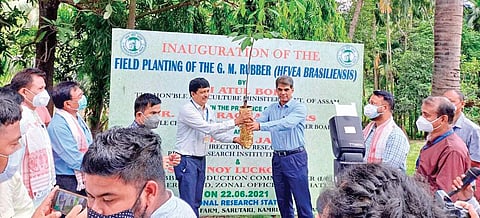

KOTTAYAM: In a major experiment in rubber farming, Rubber Board has started field trial of world’s first genetically modified (GM) rubber in Assam. Developed in the biotechnology laboratory at Rubber Research Institute of India (RRII) in Puthuppally, Kottayam, the new variety was planted at board’s Sarutari research farm in Guwahati on Tuesday.
The Rubber Board launched the field trial of the GM Rubber in Assam a decade after Kerala Government denied permission for the same citing its possible adverse impact on environment and apprehension on GM crops. Having the capacity to withstand adverse climatic conditions, the GM variant is expected to give a big boost to rubber production in the country. “It’s a major achievement as we are the first to plant a GM crop on the soil, while others are still keeping them in labs. The new crop will greatly benefit farmers once the trials are over. It will resist reduced moisture or drought, low and high temperatures as well as high light intensity,” said Dr James Jacob, director, RRII.
The new crop is expected to cut short the maturity period of rubber, indicating chances for early yielding as well. “While the growth of young rubber gets slower during the winter season in the North East, plants do not get enough light during monsoon, delaying their growth. Lack of adequate water during summer also creates stress on plants. As the GM rubber can overcome these issues, its growth will be faster. Hence it will be ready for tapping earlier than normal rubber. The exact time of maturity and tapping stage will become clear in the field trial,” Jacob added.
According to Dr K N Raghavan, chairman and executive director, the crop was planted on an experimental basis and not on a commercial basis. Raghavan also dismissed apprehensions over the GM variety stating that field trials commenced following all mandatory bio-safety measures applicable to field trials involving GM crops.
“The GM rubber was developed by inserting the MnSOD gene, which was taken from the rubber plant itself. Its copies were multiplied in the laboratory and reinserted into a cell of the rubber plant which was then regenerated into a full plant that is now planted. There are no plant species in India that can breed with natural rubber. Therefore, there is no risk of genes flowing from GM rubber into any native species, a concern often raised by environmental groups,” he said. The board authorities also dismissed concerns of antibiotic resistance genes from a plant citing that such genes would never come into contact with microbes or disease causing bacteria.
Though different from Bacillus Thuringiensis (BT), GM Rubber is the second genetically modified crop to start field trial in India after Bt. Cotton. In 2010, the Genetic Engineering Appraisal Committee (GEAC) had given permission to open field trials of GM rubber at Chetchackal, Thombikandom, in Kottayam. However, the then LDF government denied approval and Minister for Agriculture Mullakkara Ratnakaran had requested the Union Government to revoke the approval stating that Kerala wanted to remain a state free of GM crops.